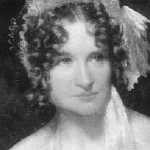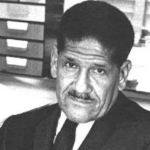for Kenward Elmslie
Up from the valley
now and then a chain saw rising to a shriek, subsiding to a buzz
“Someone” is “cutting in his wood lot” another day
shows they are not
someone is two men clearing shoulders
of a narrow high-crowned road
stacked poles were lately sapling
the leaves on the slash gone limp, unstarched, unsized
one man with one fierce eye and where the other should be
an ill-knit cicatrix
men who don’t make much aren’t much
for spending what they do
on glass eyes, tooth-straightening devices (“a mouth
like the back of a switchboard”), nose jobs, dewenning operations
a country look prevails
and a vestigial fear of the evil eye lurks
“. . . my skin creeps . . .”
Out of Adamant Co-op
men in “overhauls” step into evening rising
in long-shadowed bluish haze to gold and pink
by Sodom Lake (was it that any Bible name
was an OK name?) and boys stare unabashed
and unaggressive not what the man on the bus fled
from his one day job talking excitedly about
“teen-age Puerto Rican tail-bait” and
“You can have New York!” Some present
you’d rather have wouldn’t you an apple tree
that climbed up into keels over
sad, and too bad, the best apples on Apple Hill
still, it can be propped or budded on new stock or just
that it once was there
Driving past, driving down, driving over
along the Winooski
The Monument Capitol
buildings of rusticated granite marred
to our eyes by etched polished granite remodeled downstairs
may be found by a future happily heterodox
“There’s a touch of autumn—
there’s another touch of autumn”
and the dark tranquility of hemlocks encroaching on untilled fields
“You can’t make a living
plowing stones” subsistence
farming is well out of style: “You can’t call it living
without the margin”
coveted obsolescence!
a margin like that on this page
a paper luxury “Collectors”
the lady in the antique shop said “are snapping up
silver” “Since we’re off the silver standard?” “Why,
maybe so” Perhaps
six 1827 Salem coin-silver spoons for $18
or what about
“Have you The Pearl of Orr’s Island?”
“That’s a book I’d want to read myself.
I’m from here but live in Florida.
Winters are too hard: 40 below.
You don’t feel it though
like zero in Boston. I’ll take St. Johnsbury any day
over Boston.”
Over St. Johnsbury the clouds shift in curds
and a street goes steeply down
into Frenchtown by the railroad station
into which anachronistically comes
a real train: yesterday’s torment of dust-exhaling plush
on the backs of bare knees today’s nostalgia
but not much. Curls cut out of wood, brick
of a certain cut and color, a hopped-up cripple
on a hill above his pond, a slattern
frowning at the early-closed state liquor store,
an attic window like a wink,
The Scale Co., St. Johnsbury has everything
Not this high hill a road
going in undergrowth leads up to
by walls of flat cleared-field stones
so many and so long a time to take
so much labor so long ago and so soon
to be going back, a host to hardhack
and blueberry baby steps
first fallings from a sky
in which the wind is moving furniture
the upholstery of summer coming all unstitched
the air full of flying kapok
and resolutions: “remember to fetch the ax
whack back pine intrusions”
from the road turning down to a lower field
and across the roughest one the County keeps
a woman and a boy come up
on heavy horses. “Morning!
Had frost
last night at Adamant.
Might have a killing frost
tonight.” Quick and clear as the water
where cress grows the cold
breaks on the hills to the soft crash
of a waterfall beyond
a beaver pond
and slides on
flinging imaginary fragments of cat’s ice
from its edges to flash
a bright reality in the night sky and it —
the cold—stands, a rising pool, about
Sloven’s farmhouse and he dreams
of dynamite. A bog sucks
at his foundations. Somewhere a deer
breaks branches. The trees
say Wesson. Mazola
replies a frog.
It doesn’t happen though the cold
that is not that night. It happens all right
not then when the white baneberry
leans secretively where a road forks
met with surprise: “Why here it is:
the most beautiful thing.” The spirit
of Gelett Burgess sets mother Nature
gabbing. “That’s my Actea pachypoda, dear, we
call it Doll’s-Eyes.” Got up as smart
as ever in muck and dank she belches
—“’Scuse: just a touch of gas”—
swamp maple flames and ambles over and plunks
down on a dead rubber tire
to contemplate smashed glass and a rusty tin
and “some of my choicer bits: that
I call Doctor’s Dentures. These
are Little Smellies.” Not
the sort you look to meet so near
gold-domed, out of scale Montpelier
a large-windowed kind of empty public bigness
so little to show, so much
to take pride in rather more than on the way to Stowe
a pyrocrafted maple board in a Gyp-to-teria
IF MORE MEN WERE SELF STARTERS
FEWER WIVES WOULD HAVE TO CRANK.
Welcome to the chair lift and cement chalet.
Days
of unambiguous morning when dawn
peels back like a petal to disclose blue depths
deep beyond all comprehending and tall field growth bends
with a crushing weight of water cut
into sac-shaped portions, each less than a carat
and which streak an early walker’s trouser legs
“You’re soaked!” crossing on a door
the spill to where Nodding Ladies’ Tresses
pallidly braid their fragrance and the woods
emit their hum. Days
when the pond holds on its steel one cloud
in which thin drowned trees stand
spare shapes of winter when summer
is just loosening to fall and bits of ribbon
from an electric typewriter patch a screen.
Croquet days, scissor-and-paste nights
after dinner on the better sort of ham
and coffee strong enough to float a goose egg.
Are those geese, that V, flying so early?
Can it be so late? in the green state
needles, leaves, fronds, blades, lichens and moss create
Can it be so soon before the long white
refrozen in frost on frost
on all twigs again will flash
cross cutting star streaks—the atoms
dance—on a treacherous night
in headlights?
“Horrible Cold Night
Remain at Home”
“Clear and Beautiful
Remain at Home”


















Comment form: